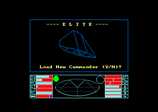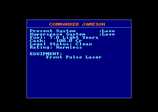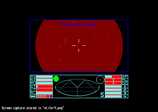Elite
Copyright : Firebird | Reviewed by : Ritchardo
The single most famous 8-bit game and the one who?s legacy lives on the longest and brightest, Elite first shot to fame on the BBC Micro in 1984 and was soon re-programmed for just about every home computer that was available.
Eagerly anticipated at the time, Elite picked up rave reviews on every platform it was released on and the Amstrad version was no different with Amstrad Action dedicating dozens of pages in reviews, playing guides and previews to David Braben and Ian Bell?s game.
Still a forerunner in every conversation about just what is the greatest Amstrad game of all time, Elite was given away with issue 100 of Amstrad Action after winning a poll to determine what was the greatest. Even more recently, Retro Gamer readers voted it as their favourite retro game of all time. High praise but does the reality match up to the hype?
Graphics
Bearing in mind how much is crammed into the machine code, the smoothness and quality of the vector graphics are nothing short of remarkable. Elite plays at a remarkable speed for a game of its size and is more colourful than the other 8-bit versions.
The vector graphics are the best that had been seen to date and although they have since been topped by other vector games like Starstrike II and Starglider, the wire frames are still fairly impressive and do the game no harm what so ever.
Each system has differently coloured suns and space stations and a wide variety of coloured ships will zoom across your display window at various points in the game - all of which helps to bring to life a living and breathing little universe.
Menu presentation is clear and easy to navigate and the control dials are perfectly functionable if not revolutionary in design.
Better than any space game that had come before it and most that came after, Elite looked fantastic and while it?s not as mind-blowing to look at now, it?s hard to imagine how anyone could?ve expected any more at the time.
Sound
Surrounded by good graphics and excellent gameplay, Elite?s sound sticks out like a sore thumb. Mostly wimpy and weedy, the sound of your lasers, one of the most common sounds you?ll hear if you hope to succeed, is particularly lightweight sounding and is a real disappointment.
The title music is a little treat though and it?s just a pity it doesn?t extend into the game itself but you can?t have everything I suppose and if it?s a choice between no music and fast graphics or full music soundtrack and slower visuals, I know what I?d go for.
Gameplay
Revolutionary in design, each game of Elite is like a blank canvas that it is left to the individual to develop and create. The sense of freedom in Elite is unlike any game that came before it and a number that came after.
Part shoot-em-up and part trading sim, the direction of each game of Elite is entirely up to the person sitting at the controls and the real joy of Elite comes with the exploration of the galaxy which will take years to fully explore and see everything.
The player has the choice as to what direction they want their game to go on. Want to be a space pirate? You can. Want to be a drug smuggler? Go ahead. Want to be a law abiding space trader? You can do that too. As with life, there are no right and no wrong choices to be made and if you?re willing to devote the time to it then Elite will reward your patience with an involving game that is second to none.
This level of patience is the game?s only real Achilles heel though in terms of gameplay. The difficulty level is steep to the point of ridiculousness and it will taken literally dozens of attempts to work out how to dock with the space station but the first time you do it will fill you with a greater sense of achievement and pleasure than just about anything else you could hope to take from a computer game.
The controls are fairly difficult to come to terms with and, again, it?s a case of practice makes perfect. Overcome the initial confusion and frustration and you?ll uncover a surprisingly responsive game that fits as naturally as a glove.
The Amstrad version has a handful of special missions that are unavailable on other 8-bit versions of the game.
Unlike any other game, ever. Elite is one that doesn?t leave anyone on the fence. You either love it or absolutely hate it. If you?ve never given it a go then you?d be a fool not to try but do be warned that it isn?t to everyone?s tastes and that you?ll have to devote an awful lot of time to getting better.






 Latest additions to the review archives
Latest additions to the review archives Thanks to everyone below for your contributions
Thanks to everyone below for your contributions Bookmark
Bookmark








